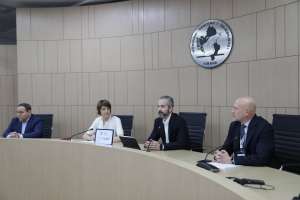SARAJEVO, February 4 (FENA) - Bosnia and Herzegovina and the Republic of Albania have no outstanding issues. However, there are only honorary consulates in Sarajevo and Tirana, but not the embassies, making it difficult for these two countries to enhance their relations, said in an interview with FENA the Honorary Consul General of Albania to BiH Muharrem Zejnullahu.
In the 1990s, he was the ambassador of BiH to Albania, and in 1998 this embassy was closed. Albania was among the first countries which recognized BiH as an independent and sovereign state and opened its embassy in BiH in 2010, but also closed it in 2014, because BiH did not open its own in Tirana, although such an agreement existed.
Zejnullahu noted that the embassies are often closed due to political relations that get complicated at some point between the two countries, and as another reason for this he stated the financial situation, that is, the inability to cover the expenses of the functioning of the embassy.
“As much as the relations are friendly and there are no controversial issues between these two countries, something is not functioning, as both countries are acting like this. Therefore, the non-existence of the embassies is felt across the board, regardless of the presence of honorary consulates with limited competencies,” he explained.
The consulates, added Zejnullahu, are limited to economic, cultural and tourism cooperation, but when there is no country's diplomatic political representative on site, then such a lack of communication is felt significantly.
He reminded that BiH has had a rigorous attitude towards Albania for a while in terms of visas, similar to what BiH has towards Kosovo today, but citizens now travel from one country to another only with personal documents, which is most felt when it comes to tourism cooperation.
A large number of tourists visit the Albanian coast, on the other hand, the number of tourists from all over Albania who come to BiH in the summer and winter period is significant. Zejnullahu also reminded that the roads between the two countries are in a very bad condition, making travels difficult, and there is no direct air link.
In that sense, the lack of embassies is truly felt, because if the embassies were there, then the pressure would be greater to solve this issue, noting that there is less than 400 kilometers between Sarajevo and Tirana, but to cross this distance, it takes between eight and ten hours , and even longer with a bus.
He reminded that in 2000, a Memorandum of Cooperation between BiH, Montenegro and Albania was signed on the construction of a motorway that would go through Sarajevo-Foča-Nikšić-Podgorica-Skadar-Tirana. However, this project is no longer mentioned.
He pointed out that the Albania's Tourist Week should have been held in BiH last year in order to bring together all segments of the tourism offer, but also the issue of infrastructure, but the event was not held.
Zejnullahu announced that the issue will be reopened when a delegation from the Albanian Ministry of Foreign Affairs arrives on 7 February in a visit to BiH, claiming that countries are insufficiently promoting their tourism potentials that are in fact rapidly growing in Albania.
He recalled that in 1998, there was not a single boarding house in the Albanian coastal town of Durres, let alone a hotel, and today there are more than 600 of them in Durres seaside, that is around ten kilometers long.
“There are no political obstacles to improving the relations, which is the most important thing, but in all other segments, cooperation is lacking, and only by improving economic, tourist and cultural cooperation, it is possible to make greater prosperity for the both countries,” said the Honorary Consul of Albania in BiH.
Speaking about cultural cooperation, he said that it has not been at a high level because Albanian artists have not been guests in BiH for a while now. The Opera ensemble from Albania visited Sarajevo 15 years ago, and this was at a time when it was difficult to obtain visas for their arrival.
Since Zejnullahu is the President of the Albanian Community in BiH, he says that there are about 12,000 Albanians living in the Federation of BiH, while there are only few families in Republika Srpska that have returned to their pre-war places of residence.
However, he warned of the attitude of BiH towards the citizens of Kosovo due to the strict visa regime, adding that the independence of Kosovo was recognized by 110 countries and almost all the countries of the European Union except Greece, Slovakia, Romania, Spain and Cyprus.
“Citizens of Kosovo do not have any problems when it comes to documents and visas for traveling to all of these countries, but it is impossible for them to come to BiH, because, not only that BiH does not recognize Kosovo’s independence, but it does not recognize any document issued by the state of Kosovo,” stressed Zejnullahu.
He explained an excessively complicated process of obtaining a visa for persons who want to visit their relatives. Firstly, it is necessary to collect numerous documents and go to the Foreigners’ Office, then a person has to go to Skopje to the BiH embassy to submit a visa application, the embassy then sends a proposal for granting a visa to the Ministry, and only then the minister approves the visa with a special decision.
“This is usually done in case of death in the family, or if there is a case of illness and the party in questions possesses all the necessary documents. In other situations, there is no way to come to BiH. It is impossible to come as a tourist, and the situation is similar with business entities whose representatives usually meet in Plužine on the Montenegrin territory to talk about business with their counterparts in BiH,” explained Zejnullahu.
He tried to talk to most of the BiH officials in order to solve this issue, but he believes that at the moment, there is no political will on either sides, adding that Kosovo has introduced visas for BiH in order to stimulate the BiH side to do something in order to make it easier for people to travel freely without obstacles.
Zejnullahu believes that it would be sufficient for BiH to recognize the documents of the citizens of Kosovo, because it would be a significant relief for family relations and for students, but also for business people. Unfortunately, he does not expect for this problem to be resolved any time soon.
In an interview with FENA, Zejnullahu asserted that the regime that BiH has towards the citizens of Kosovo is worse than the one existed during the dictatorship of Enver Hoxha towards Yugoslavia, since there were no tourist visits at that time, which is why the Albania's Honorary Consul to BiH Muharrem Zejnullahu does not see any difference between that period and the present day situation.
Watch http://www.fena.ba/video/1416
Download https://drive.google.com/drive/folders/18zv964J-rhWH3nNC88XaGJpSi_VKjdBz?usp=sharing
(FENA) S. R.










